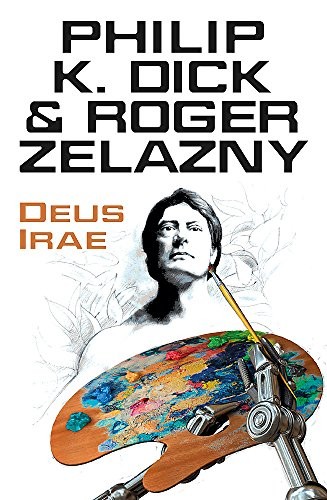Paperback, 192 pages
Published Oct. 10, 2013 by Gollancz.

Paperback, 192 pages
Published Oct. 10, 2013 by Gollancz.
Deus Irae is a post-apocalyptic science fiction novel by American authors Philip K. Dick and Roger Zelazny. It was published in 1976. Deus irae, meaning God of Wrath in Latin, is a play on Dies Irae, meaning Day of Wrath or Judgment Day. This novel is based on Dick's short story "The Great C."
Dick began the book but realized he did not know enough about Christianity to finish it. He asked Ted White to collaborate on it with him, but after reviewing the manuscript White never got started. Zelazny discovered the manuscript in White's home in early 1968, read it, then contacted Dick and agreed to work on it with him. Work proceeded sporadically over several years as each author forgot about it in turn (and Zelazny's cat took the opportunity to urinate on the original manuscript). But they finished it quickly in the spring of 1975 when …
Deus Irae is a post-apocalyptic science fiction novel by American authors Philip K. Dick and Roger Zelazny. It was published in 1976. Deus irae, meaning God of Wrath in Latin, is a play on Dies Irae, meaning Day of Wrath or Judgment Day. This novel is based on Dick's short story "The Great C."
Dick began the book but realized he did not know enough about Christianity to finish it. He asked Ted White to collaborate on it with him, but after reviewing the manuscript White never got started. Zelazny discovered the manuscript in White's home in early 1968, read it, then contacted Dick and agreed to work on it with him. Work proceeded sporadically over several years as each author forgot about it in turn (and Zelazny's cat took the opportunity to urinate on the original manuscript). But they finished it quickly in the spring of 1975 when the publisher demanded the manuscript or repayment of the advance paid to Dick. The editor discovered Zelazny had sent photocopies of some pages and demanded the originals as per Doubleday's policy; much to Zelazny's chagrin, he had to send in the urine-stained pages and he always wondered what the editor made of them.